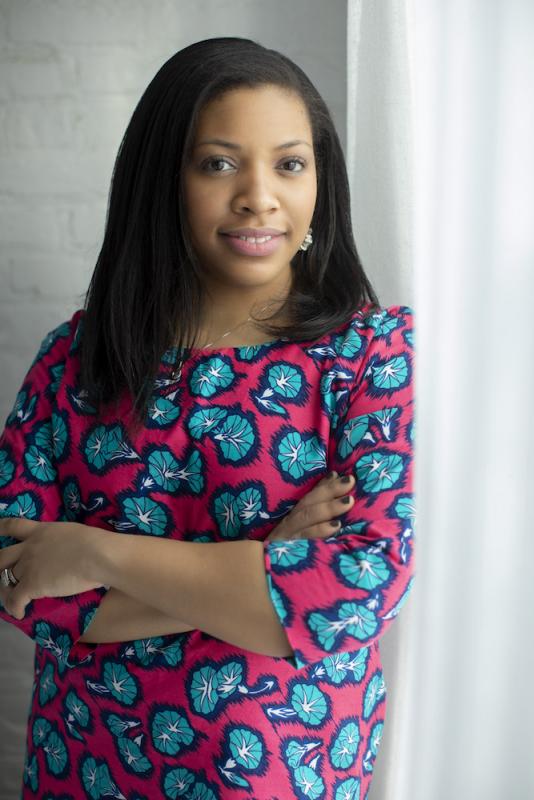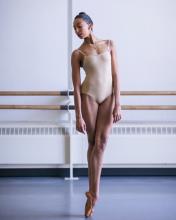Inviting Hope to Stay: A Conversation with Kellee Edusei of Dance/USA

Kellee Edusei. Photo by Maria Ponce
Kellee Edusei (she/her/hers) recently became Dance/USA’s executive director, but she first became smitten with dance in her hometown of Washington, D.C. When Edusei’s grandmother took her to audition at the Washington School of Ballet, she began a lifelong dance practice that has included internships with choreographer Gesel Mason, making Dance Place a second home, and a double major in Dance and Black Studies at the College of Wooster in Ohio. Edusei’s early work experiences at Movement Research, Bates Dance Festival, and Jacob’s Pillow opened up a path as an arts administrator and continued, as Edusei puts it, a “long history and love for dance.” She joined Dance/USA 13 years ago, gaining knowledge and perspective on the changing needs of dance communities around the country as the director of Member Services. In conversation with the Arts Endowment’s Director of Dance Sara Nash (she/her/hers), Edusei shared more of her story, her views on the role of service organizations, and the importance of empathy as we look to the future of dance.
NEA: So here we are. It’s March 2021—what does it mean to you to lead a service organization at this moment in time?
KELLEE EDUSEI: It’s an incredibly crucial time. This moment we’re experiencing—and I acknowledge we’re all having different experiences in this moment, but this collective moment is charged so much by hope and uncertainty. I think that hope can breed innovation, love, joy, creativity. It’s energizing and can really lead to new pathways of being, and then conversely this uncertainty state, being in that mode can make you stuck in a way that is unmovable. It can breed fear.
There’s a quote by Maya Angelou that I love: “Hope and fear cannot occupy the same space. Invite one to stay.” When COVID started to emerge and we were starting stay-at-home orders, it gave me the hope that I needed to be present every day, not just at work but also in my personal life. I personally have invited hope to stay, and that’s been really life-giving. I see hope and possibility manifesting in infinite ways. It centers back on the choices that we’ll make to move our personal selves forward but also any institution that we may be a part of.
NEA: Do you see the role of service organizations changing in this moment?
EDUSEI: I don’t because we’re designed to serve a sector of the performing arts. Where I think the transformation will take place is how we serve. I have been a part of a long conversation asking, “Is the role of a service org to lead or to follow the field that they’re there to serve?” At the end of the day, it’s a delicate balance, but it’s about how we’re showing up. Leading requires deep listening and understanding. We need to lead the field and encourage it to transform by being more inclusive and more civically minded. How we are encouraging the field to move itself forward might change from that follow sensibility to more deeply leading. Leading but also listening, and of course responding and being timely.
NEA: It’s kind of a dance, right?
EDUSEI: It really is, and there are moments where the field is really ripe for change and saying, “This is what’s happening and we’re heading in this direction.” Dance/USA’s role can be, “Yes, and here’s another idea, and how can we help you incorporate this into the work that you’re doing?” so that it’s not necessarily serving one part but it’s serving all parts.
NEA: How are you seeing COVID-19 recovery and repair happening for dance over the next three to five years? I’ll also acknowledge that COVID-19 is only one of the crises and major events that we’ve been dealing with over the last year.
EDUSEI: It’s funny, you’re saying three to five years and I almost feel like that’s too much of a chunk of time. There's a lot of uncertainty right now and that may always be the case, but we need to acknowledge that there are new ways of being that are still manifesting themselves. I am very present and curious to see some of the things the field has already started to experiment with. There are lots of questions being asked, a lot of testing and adaptations. And there’s a lot of great work happening around being more inclusive and more mindful of the systemic issues pressing upon the field and our society.
I think that change or evolution will be incremental. It will take time for us to have theaters packed like they were “in the before times.” Dancers being back as they were before may also take time. There will be that safe return to theaters and people going back to their physical work environments. Conversely, I do think that there’ll be more flexibility in the form of digital offerings for performances or greater empathy and flexibility in being physically present in a workplace.
NEA: Can you expand on that idea of having more empathy and how that relates to the ways we are working?
EDUSEI: Dance/USA for a long time has had a flexible work policy. Not a lot of organizations did, and COVID knocked us [all] out of our comfort zone. Very rapidly, organizations needed to figure out how to continue moving forward, to figure out, “How are we going to do this?”
As people start to get their vaccinations, as we start to come back together, will we maintain those same ways of being? COVID has been very, very difficult, but going back to that sense of hope, what will we take from this moment and continue implementing going forward? What did we gain during this time that we do not want to lose? It’s that sensibility of being more flexible, being more empathetic. It’s okay that we don’t all need to be in the office. Maybe we’ll get to a greater work-life balance or work-life integration.
Mental health has been a huge conversation—people feel isolated and disconnected, and that sensibility has been plopped in the workplace. It’s my hope that it’s no longer taboo, that people can be more authentic in bringing their whole selves to work. We’re actually seeing one another now. You’re on Zoom and you can see a child run in the background or a cat go across a screen. We’re human, and so will organizations start leaning more into that sensibility, is that here to stay?
Some other things I believe we will start to witness [are] how artistic work might evolve and change due to COVID and due to a sense of urgency around dismantling systemic racism and systemic oppression in our ecosystem. Will we start seeing different artistic choices, new collaborations, new genres or art forms emerging? Who knows? Going back to that hope. That’s kind of exciting. What is the ecosystem going to hold onto, and with its resilient, creative energy, take and transform and share back with us?
NEA: It’s definitely going to show up—it’s already showing up in people’s work.
EDUSEI: The dance ecosystem may not have some institutions with us any longer, and we will also witness institutions that have transformed into something new. We might see new organizations or artist collaboratives or collectives forming. I do believe that there will be greater racial equity within some institutions, and that will trickle down into the ecosystem because it is a time for change to be implemented, and I’m feeling a sense of accountability in this moment. We cannot turn back. I think that the memory in particular of George Floyd’s murder will continue to stick with us and there’s a greater sense of urgency for racial equity in the field and a greater sense of accountability.
NEA: That definitely seems like hope to me.
EDUSEI: I think too, the re-centering of artists—there’s been so many initiatives and conversations where [it’s] the artist who was harmed in COVID. When you think about the cracks in our system, that was a place that the light was shined very brightly, and we will continue seeing artists centered in fieldwide conversations or initiatives.
This might be more like five to 10 to 15 years—a generation of dance artists have also been hurt—a whole class of students have not had a year’s worth of training or they may, through COVID, have lost interest [in dance]. We need to consider how this moment impacted future artists and administrators.
NEA: And studios closing. What does that mean for what’s to come?
EDUSEI: Exactly. How are we currently thinking about engaging, giving access to, mentoring, supporting the future?
NEA: Is there anything else that is important to you for people to know about you or Dance/USA as you step into this new role?
EDUSEI: I am committed to seeing us through our next life cycle, however long that may be. Dance/USA is in a transformative state itself around its equity and justice priorities, and I am very much interested in supporting the field and acknowledging that we are a field made up of humans that desire to be seen, heard, and supported. I myself have great empathy for the work of the administrators, of the artists. I danced all through my life, and so I am here for this field and am truly its advocate, all while I balance my life as a wife and a mother.





